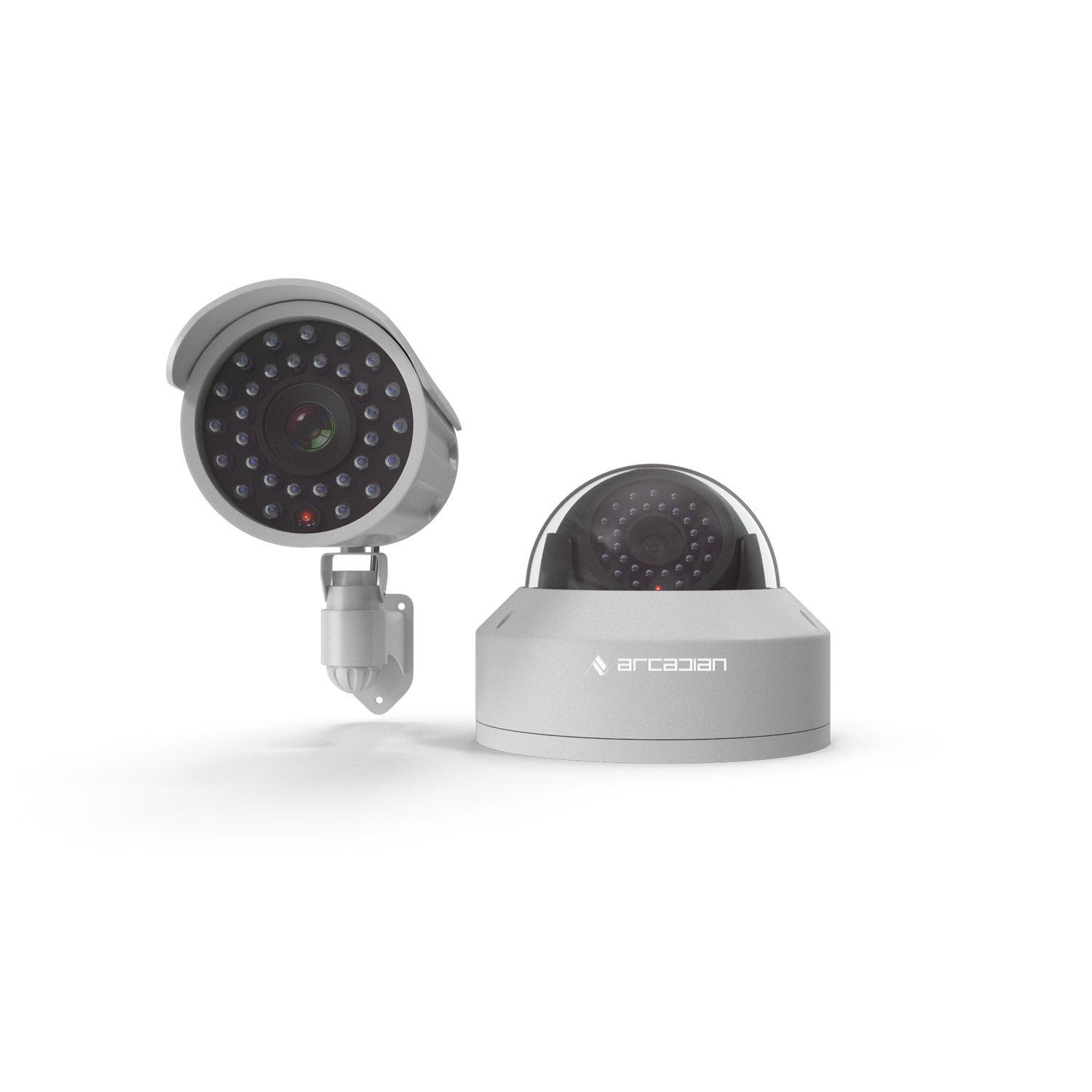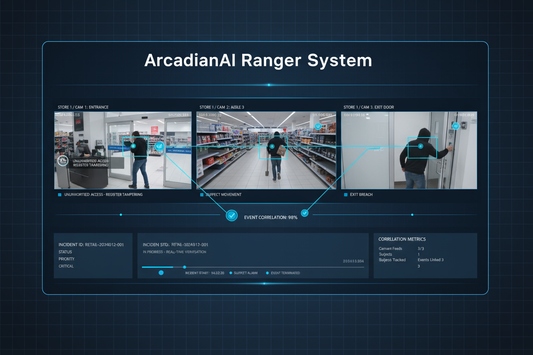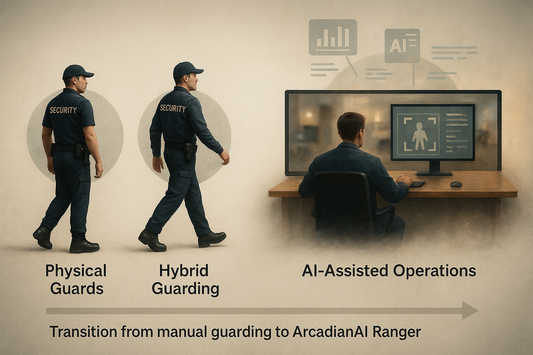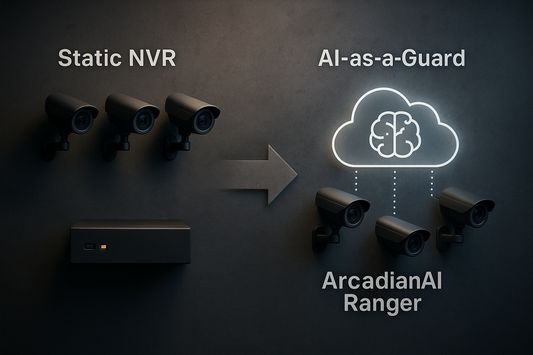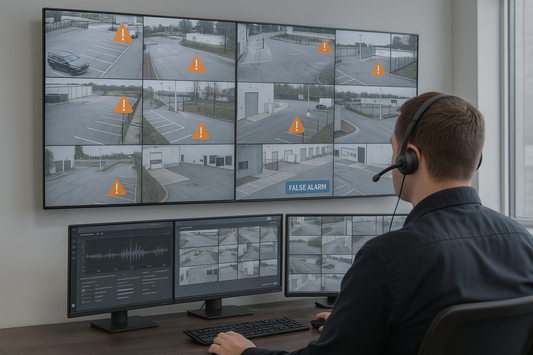Privacy vs Security in Physical Security: Striking the Balance in a World of Risks
Privacy and security often collide in physical security—from daycare cameras to city surveillance. This post unpacks real incidents, risks, and how ArcadianAI ensures both safety and trust.
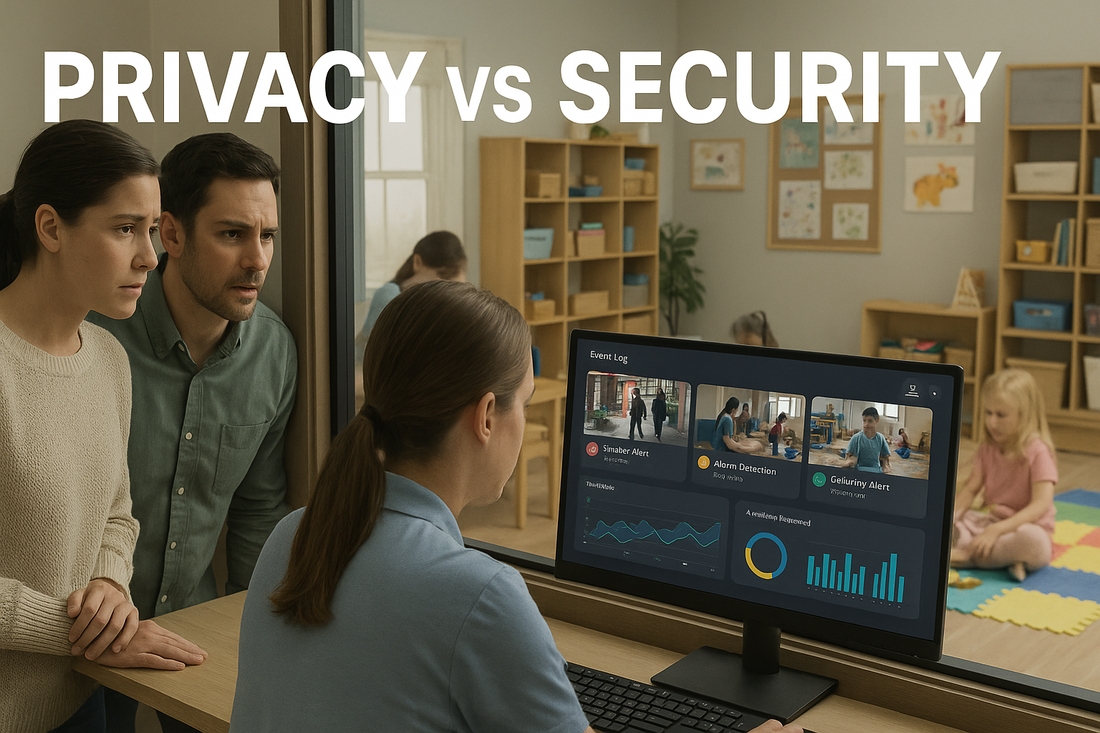
Introduction
The tension between privacy and security in physical security is one of the defining debates of our time. In a world of constant surveillance, from CCTV cameras in daycare centers to biometric access control in workplaces, the need for safety often conflicts with the right to privacy. ArcadianAI, with its adaptive AI assistant Ranger, sits at the center of this debate—proving that it is possible to keep communities secure without crossing ethical or legal boundaries.
According to a 2024 survey by the Pew Research Center, 79% of Americans are concerned about how much data companies and the government collect about them. At the same time, the FBI reports that violent crime costs U.S. businesses and households over $120 billion annually in losses, lawsuits, and prevention measures. The tension is clear: everyone wants safety, but no one wants to live in a surveillance state.
Traditional systems from Verkada, Genetec, Milestone, Eagle Eye Networks, and Rhombus have often leaned toward “more cameras, more recording” as their default philosophy—without solving the core challenge: how to keep people safe while respecting their right to privacy. ArcadianAI challenges this binary thinking by using contextual AI that learns and adapts without indiscriminately hoarding footage.
This post explores the full landscape of privacy vs security in physical security—covering daycare scandals, daily-life incidents, global regulations, competitor pitfalls, and how adaptive AI platforms like ArcadianAI create a new standard for trust and protection.
Quick Summary / Key Takeaways
-
Privacy and security often conflict in physical security.
-
Daycare surveillance scandals show risks of misuse.
-
Regulations like GDPR and HIPAA limit excessive monitoring.
-
Legacy NVR and CCTV fail to balance privacy with safety.
-
ArcadianAI Ranger enables adaptive, privacy-conscious security.
Background & Relevance
The debate has sharpened in the last two years. The European Union’s GDPR and California’s CCPA have increased scrutiny on how video surveillance data is stored, shared, and used. Meanwhile, high-profile incidents in daycares, retail stores, and residential complexes have revealed both the life-saving power of cameras—and the devastating misuse of surveillance when privacy controls fail.
For example:
-
In 2024, a daycare in New Jersey faced lawsuits after unauthorized staff accessed and shared footage of children, sparking outrage from parents and regulators.
-
In 2023, Verkada admitted that hackers had breached their cloud camera system, exposing feeds from schools, gyms, and even hospitals.
These real-world cases prove that privacy and security are not abstract debates—they have direct consequences for families, businesses, and public safety.
Core Topic Exploration
What Is the Difference Between Privacy and Security in Physical Security?
-
Security: Protecting people, property, and assets from threats, theft, violence, or accidents.
-
Privacy: Protecting individuals’ personal space, dignity, and data from intrusion, surveillance abuse, or unauthorized exposure.
The challenge lies in the fact that too much security can erode privacy, while too much privacy can create vulnerabilities.
Daycare Case Studies: When Cameras Save vs When They Harm
Daycares illustrate this tension more than any other sector.
-
Life-Saving Security Example: In 2023, a daycare in Houston prevented a child abduction because AI-powered cameras flagged an unauthorized person trying to enter the premises. Security intervened within seconds.
-
Privacy Disaster Example: In 2024, parents in a Florida daycare discovered that live feeds intended for parent viewing were hacked and streamed on the dark web.
Legacy VMS players like Genetec or Milestone often treat surveillance as “record everything, review later.” But ArcadianAI’s Ranger applies event-driven intelligence, minimizing data retention while maximizing safety outcomes.
Security at Home: How Cameras Impact Daily Life
Homeowners install Ring, Nest, and Lorex cameras for protection. But countless incidents show the privacy risks:
-
In 2023, Ring settled with the FTC for failing to stop employees from spying on customers.
-
Smart cameras with weak passwords are hacked regularly, exposing families to stalking and harassment.
ArcadianAI advocates for privacy-by-design principles—AI detection without unnecessary human access—ensuring safety without turning homes into panopticons.
Retail & Workplace Surveillance: Balancing Shrink Reduction and Employee Privacy
Retail giants like Walmart, Target, and CVS invest billions in surveillance for loss prevention. Yet employees often raise privacy concerns over being constantly watched.
-
In 2024, a class-action lawsuit in Illinois accused a retail chain of violating biometric privacy laws by scanning employee faces without consent.
-
Over-surveillance can also damage morale, with studies showing that 60% of workers feel demoralized when they believe cameras are monitoring them excessively.
ArcadianAI’s solution: contextual AI alerts that detect theft, fraud, or unsafe behavior without storing hours of employee activity unnecessarily.
Schools and Universities: The Thin Line Between Safety and Student Privacy
The debate intensifies in schools:
-
After several school shootings in the U.S., many districts invested in AI surveillance systems.
-
But groups like the ACLU warn that excessive surveillance disproportionately targets minority students and creates a culture of suspicion.
Unlike traditional NVR solutions, ArcadianAI’s Ranger focuses on anomalies, not identities, making schools safer without violating students’ privacy rights.
Healthcare and HIPAA: Privacy Risks in Security Footage
Hospitals face some of the strictest privacy rules under HIPAA. Yet incidents show the danger of mishandling surveillance data:
-
In 2023, a U.S. hospital was fined millions after staff leaked security footage of patients in compromising situations.
ArcadianAI ensures compliance by encrypting video streams, applying role-based access control, and anonymizing footage where possible.
Airports, Cities, and Smart Infrastructure
Governments often tilt the balance toward security. Cities like London, New York, and Singapore are blanketed with millions of cameras. While this reduces crime, it also sparks debates about surveillance overreach.
ArcadianAI promotes event-driven, anonymized analytics that enhance safety in public spaces without enabling mass surveillance abuse.
Comparisons & Use Cases
ArcadianAI vs Legacy Competitors
| Feature | ArcadianAI Ranger | Verkada | Genetec | Milestone | Eagle Eye Networks | Rhombus |
|---|---|---|---|---|---|---|
| Privacy by Design | ✅ Built-in anonymization | ❌ Weak controls | ❌ Optional | ❌ Optional | ❌ Limited | ❌ Limited |
| AI-Driven Alerts | ✅ Contextual | ✅ Basic | ❌ Manual-heavy | ❌ Manual-heavy | ✅ Some | ✅ Some |
| Cloud Security | ✅ Zero-trust, encrypted | ❌ Breach-prone | ✅ Moderate | ✅ Moderate | ✅ Moderate | ✅ Moderate |
| Daycare Safety Use Case | ✅ Anomaly detection + parent privacy | ❌ Breach history | ❌ High storage | ❌ High storage | ❌ Basic | ❌ Basic |
| ROI | ✅ Reduced storage & compliance cost | ❌ Breach liabilities | ❌ Complex licensing | ❌ Hardware costs | ❌ Subscription-heavy | ❌ Subscription-heavy |
ArcadianAI provides the only balance of privacy and security at scale.
Common Questions (FAQ)
Q1: Why is privacy important in physical security?
Because unchecked surveillance can lead to abuse, lawsuits, and loss of trust.
Q2: How can daycares ensure both safety and privacy?
By using AI-driven event alerts instead of open live feeds.
Q3: Do cameras in the workplace violate employee rights?
They can—if used excessively. Contextual AI minimizes overreach.
Q4: What regulations protect privacy in security footage?
GDPR, CCPA, HIPAA, and state biometric privacy laws.
Q5: How does ArcadianAI solve the privacy vs security challenge?
Through event-driven AI, encryption, and privacy-by-design architecture.
Conclusion & CTA
The privacy vs security debate in physical security isn’t going away. From daycare scandals to workplace lawsuits, the risks of getting it wrong are immense. Legacy systems like Verkada, Genetec, and Eagle Eye still operate with a “surveil everything” mindset, creating vulnerabilities and liabilities.
ArcadianAI’s Ranger flips the model: security that respects privacy, adaptive intelligence instead of blanket surveillance, and compliance built into the core.
The future of security isn’t more cameras. It’s smarter, ethical AI that protects people without violating their rights.
👉 See ArcadianAI in Action → Get Demo – ArcadianAI
Security Glossary (2025 Edition)
-
Privacy-by-Design — Security approach where surveillance systems are built to protect privacy from the ground up.
-
NVR (Network Video Recorder) — Hardware device that stores video from IP cameras; often lacks privacy controls.
-
VMS (Video Management System) — Software used to manage video feeds and recordings; traditional systems store everything.
-
VSaaS (Video Surveillance as a Service) — Cloud-based video monitoring platforms like Eagle Eye and Verkada.
-
AI Alerts — Notifications generated when AI detects unusual behavior or anomalies.
-
HIPAA — U.S. healthcare regulation protecting patient privacy, including video data.
-
GDPR — European Union privacy law governing how data, including video, is stored and shared.
-
CCPA — California Consumer Privacy Act, providing privacy rights over personal data.
-
Biometric Privacy Laws — State-level laws regulating facial recognition and other biometric data.
-
Daycare Surveillance — Use of cameras in childcare facilities, often controversial for privacy risks.
-
Access Control — Systems like keycards or biometrics used to restrict entry, raising privacy questions.
-
Dark Web Camera Leaks — Incidents where hacked surveillance feeds are sold or shared illegally.
-
Anomaly Detection — AI method of spotting unusual patterns without recording everything.
-
Contextual AI — AI that adapts to the environment and situation instead of applying a one-size-fits-all model.
-
Role-Based Access Control (RBAC) — Limiting who can view or access surveillance data based on their role.
-
Zero-Trust Security — Cybersecurity principle that assumes no system or user is inherently trustworthy.
-
Shrink (Retail) — Losses due to theft, fraud, or errors; drives surveillance in retail.
-
Panopticon Effect — Psychological impact of feeling constantly watched.
-
Surveillance Overreach — Excessive monitoring that invades privacy without proportional safety benefits.
-
ArcadianAI Ranger — Adaptive AI assistant balancing safety and privacy in modern surveillance.

Security is like insurance—until you need it, you don’t think about it.
But when something goes wrong? Break-ins, theft, liability claims—suddenly, it’s all you think about.
ArcadianAI upgrades your security to the AI era—no new hardware, no sky-high costs, just smart protection that works.
→ Stop security incidents before they happen
→ Cut security costs without cutting corners
→ Run your business without the worry
Because the best security isn’t reactive—it’s proactive.
